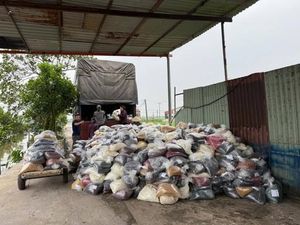In a significant move to address issues surrounding the quality of imported goods and the presence of nominee companies, Thai officials have ramped up efforts to ensure compliance with international trade standards. Deputy Prime Minister and Minister of Foreign Affairs, Mr. Phichai Chunhawachir, along with Commerce Minister Mr. Phichai Naripthaphan, convened a meeting to discuss the rampant influx of substandard products into Thailand and the necessary regulatory measures to counter these challenges.
The meeting focused on the need to scrutinize both quality and legality of goods entering the country, especially those that might be misrepresented as Thai products. "We are addressing the issue of goods that flood into Thailand, both quality and substandard, and discussing how to regulate these imports effectively," Mr. Phichai Chunhawachir stated during the press conference following the discussions.
As part of the government's ongoing initiatives, it has already taken legal action in over 29,000 cases involving subpar products. The Ministry of Commerce has also identified 852 companies suspected of operating as nominee firms, with a combined registered capital of 15.888 billion baht. Furthermore, there are an estimated 49,000 additional companies with foreign shareholders under scrutiny to determine if they are in violation of Thai laws.
Ensuring the quality of imported goods is paramount, according to the Deputy Minister of Commerce, who emphasized that consumer welfare is the primary focus. "Our principle in controlling products is to prioritize the quality of life for consumers, and we will enforce existing laws rigorously," he said.
The government has committed to inspecting all imports uniformly, adhering to industrial standards across the board, including food, pharmaceuticals, and electrical appliances. The Deputy Minister also pointed out the necessity of labeling products in Thai to ensure clarity for consumers.
Mr. Phichai highlighted the government's vigilance against counterfeit goods, particularly those sold online through platforms such as TEMU. He reiterated that any products found lacking proper certification or quality standards would be prohibited from sale in Thailand. "If we find low-cost items being sold at suspiciously low prices, especially on online platforms, we will investigate whether they have been imported legally and possess the necessary quality certificates," he stated.
In terms of nominees, Mr. Phichai explained that if a company is found to have Thai shareholders holding less than 50% of the shares, it will be investigated further. The Ministry of Commerce will collaborate with the Ministry of Interior to scrutinize company registrations and verify ownership, particularly regarding land holdings, which are typically restricted from foreign ownership.
Looking ahead, Mr. Phichai indicated that these measures are part of a short-term strategy, but there are plans for long-term legal reforms aimed at international standards. He acknowledged that certain products and services may eventually require permits to ensure that Thailand is perceived as open and accommodating while maintaining regulatory compliance.
Additionally, he mentioned that goods entering Thailand for resale or processing before export must meet stringent quality standards and possess valid certification from Thai authorities. Coordination with U.S. customs officials stationed in Thailand has been established to enhance oversight and ensure compliance with international trade agreements.
"This is a crucial issue, and we are pleased that there has been a pause in tariff negotiations to address these concerns effectively," Mr. Phichai noted. He expressed optimism that the ongoing dialogue with U.S. officials has yielded positive feedback, despite the relatively small volume of goods exported to the U.S.
The Prime Minister has underscored the importance of these regulatory measures, emphasizing that they are vital not only for consumer protection but also for maintaining Thailand's reputation in international trade. "This is a matter of national importance, and we must ensure that our actions are reasonable and justifiable under Thai law," he urged.
In the context of international negotiations, Mr. Phichai responded to concerns raised by Ms. Sirikanya Tansakul, a member of the Progressive Party, regarding the status of trade discussions with the U.S. He clarified that whether the negotiations were postponed or not is secondary to understanding the timing and appropriateness of discussions. "Thailand is not a major trading partner; we are not in the top ten. Therefore, any negotiations must align with the frameworks established by larger economies," he explained.
Mr. Phichai emphasized that the ongoing changes in trade dynamics necessitate a careful approach to negotiations, particularly in light of the fluctuating economic conditions that affect all parties involved. "We need to be aware of the conditions affecting trade and finance, and ensure that our discussions are grounded in fairness and clarity," he stated.
As Thailand navigates these complex issues, the government remains committed to fostering a transparent and fair trading environment that prioritizes quality and compliance. The officials are keenly aware that the path forward requires balancing regulatory scrutiny with the need to maintain an open market that invites foreign investment and trade.
In a related initiative, the Faculty of Fine and Applied Arts at Mahidol University has launched a project to develop cultural heritage related to ancient scripts, highlighting the potential of Thai script in the creative economy. This project aims to integrate local wisdom into contemporary products and services, showcasing the versatility and cultural significance of Thai writing.
The event titled “Aksorn Silp Sangสรรค์ Aksorn Boran Mee Chiwit” (Ancient Script Art Creation, Ancient Script with Life) featured discussions on modern applications of Thai scripts and showcased student works that blend traditional writing with contemporary design. Dr. Apilaksana Kesampholkul, the project head, noted that this initiative aims to preserve and promote Thai heritage while adapting it for modern use.
Through these combined efforts in both regulatory measures and cultural initiatives, Thailand is poised to strengthen its position in the global market while safeguarding its cultural identity and consumer welfare.




